スコットランド2200km走破 国立スコットランド博物館5 Museum of Scotland 5 新古代エジプトの陶磁器ギャラリー 青山貞一 Teiichi Aoyama 池田こみち Komichi Ikeda 2018年12月10日公開 独立系メディア E-wave Tokyo 無断転載禁 |
| スコットランド総目次へ* 国立スコットランド博物館1 国立スコットランド博物館2 国立スコットランド博物館3 国立スコットランド博物館4 国立スコットランド博物館5 国立スコットランド博物館6 国立スコットランド博物館7 国立スコットランド博物館8 国立スコットランド博物館9 国立スコットランド博物館10 国立スコットランド博物館11 国立スコットランド博物館12 国立スコットランド博物館13 国立スコットランド博物館14 国立スコットランド博物館15 国立スコットランド博物館16 国立スコットランド博物館17 国立スコットランド博物館18 国立スコットランド博物館19 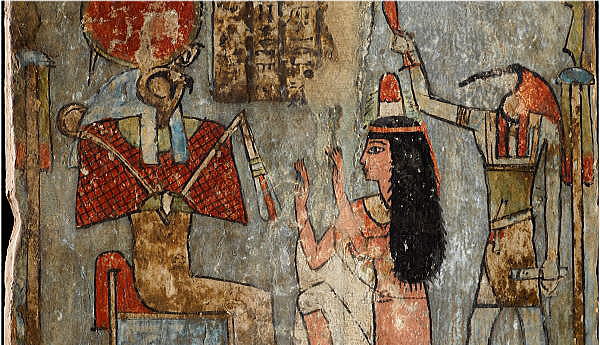 Egypt in Edinburgh and Lothians エジンバラとロージアンのエジプト You are hereHomeNational and international workSharing collectionsNational projectsScotland's Ancient Egyptian CollectionsEgypt in Edinburgh and Lothians 以下は国立スコットランド博物館が収集、所蔵する新古代エジプトの陶磁器キャラリーです。 スコットランド国立博物館には、エジプトで最初の考古学的発掘調査を実施したスコットランドの考古学者、アレクサンダーヘンリーラインドが発掘した資料があります。彼の最も重要な発見は、1000年以上使用された無傷の墓でした。 スコットランド博物館は後にエジプトでの発掘を支援し始めました。そのため、エジプト探検協会[基金]、エジプトの英国考古学学校、エジプトの研究報告書、ユネスコから提供されたオブジェクトを受け取りました。そのなかには、古代ローマで唯一知られている二重棺、羽原出身のミイラ化された数人の個人、「ジュエリーの少女」として広く知られている女性の有名なミイラの肖像画など、ローマエジプトの葬儀の資料は特に強力です。 コレクションには、王室の女性の無傷の埋葬も含まれています。これには、印象的な棺桶と金のジュエリーの並外れたセレクションが含まれています。 コレクションの多くのオブジェクトは、ペイズリー、ダーラム、リバプール、シドニーそして1950年代半ばに他の美術館に移されました。新しい常設ギャラリーである古代エジプトの再発見は2019年の初めにオープンし、コレクションから700点近くのオブジェクトを新しい方法で展示しています。 新古代エジプトの陶磁器ギャラリー 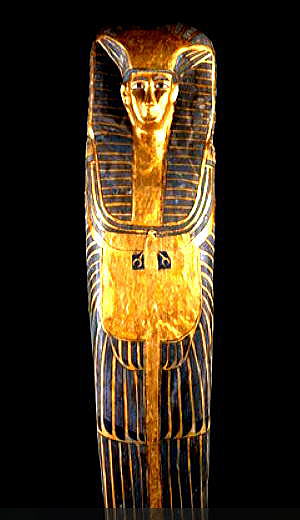 女性の棺:非常に丈の長い棺で、神秘的な装飾が施されている。蓋には青色で塗られた羽毛模様があり、黄金色の地の上には黒の細かい模様が描かれている。所有者の顔は、縞模様の麻(又は綿)のネメス(エジプトの頭巾)が巻かれており、ハヤブサの足をつけたビーズの首輪やハゲワシの胸飾りに取り囲んでいる。 Female coffin: an exceptionally tall coffin with decoration in the rishi-style. The lid has feathered patterning painted in blue with black details on a yellow ground. The owner’s face is framed by a striped linen nemes-cloth, a beaded collar with falcon terminals, and a vulture-pectoral. Source:the National Museum of Scotland 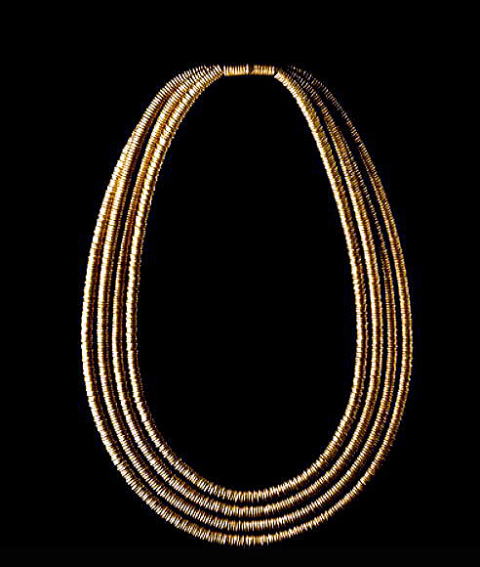 すべてが金で造られた首輪;一本の繊維の芯(パッド)に縫い付けられた四列の金の輪からなっている。 Gold Shebyu collar: consisting of four rows of gold rings threaded on a pad of fibre. Source:the National Museum of Scotland 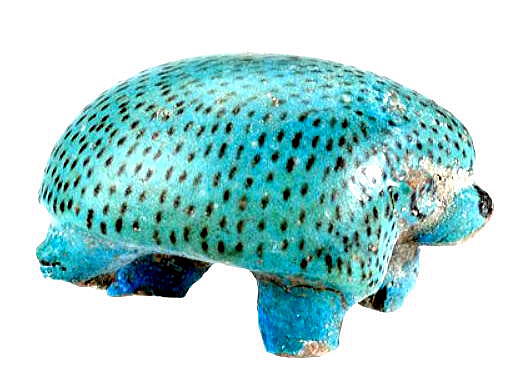 青いファイアンス焼きに茶色の斑点で針をつけた歩いている姿のハリネズミの置物:古代エジプト、中期王国時代。 igurine of a hedghog in a marching pose, made of blue faience with the quills indicated by brown flecks: Ancient Egyptian, Middle Kingdom. Source:the National Museum of Scotland 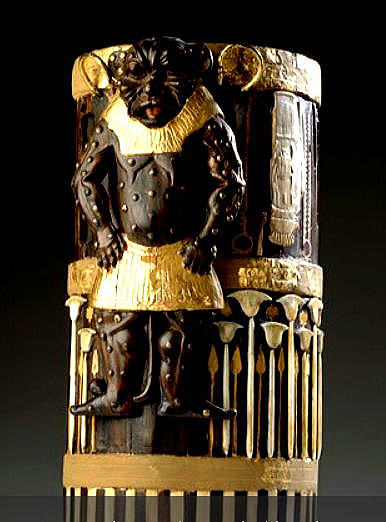 黒檀の化粧張りと象牙の象嵌と金彫金でベス神(古代エジプト神話の舞踊と戦闘の神)とアメンホテプ2世のカルトゥーシュが描かれた杉材の箱。古代エジプト、新王国、第18王朝、紀元前1550-1295年。 Box of cedar wood with ebony veneers and ivory inlays and gilding depicting the god Bes and bearing the cartouches of Amenhotep II: Ancient Egyptian, New Kingdom, 18th Dynasty, c.1550-1295 BC. Source:the National Museum of Scotland 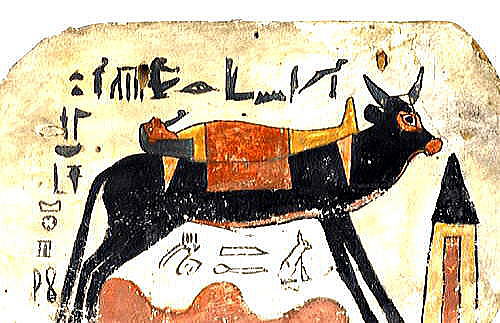 厚紙工芸の棺かミイラの入れ物から発掘された足板で、パミウと名付けられた死者のミイラを運ぶApisの雄牛を描いたピラミッドの墓に向かって砂漠の上を歩いている姿が描かれている。:古代エジプト人、テーベス、アッパーエジプト、第3中間期、第22王朝、ファラオ・オソルコン3世、紀元前790-762年 Footboard of wood, from cartonnage coffin or mummy-case, depicting the Apis bull carrying the mummy of the deceased, named as Pamiu, striding over the desert towards a pyramidal tomb: Ancient Egyptian, from Thebes, Upper Egypt, 3rd Intermediate Period, 22nd Dynasty, Osorkon III, 790-762 BC. Source:the National Museum of Scotland  ゲッソーで覆われた木の碑(ステラ)、上が丸く、レルハクティ前に跪いた女性を描いた絵画、半分に分かれていて、修復した:古代エジプト、テベス、上エジプト、第22王朝後期、第三中期。 Stela in wood covered with gesso, round topped and painted showing a woman kneeling before Re-Horakhty, split in half and repaired: Ancient Egyptian, from Thebes, Upper Egypt, late 22nd Dynasty, Third Intermediate Period. Source:the National Museum of Scotland 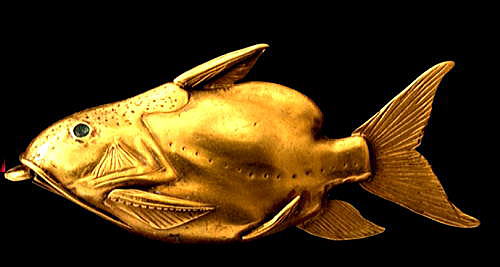 金のペンダントで逆さまのナマズを彫ったもの。中心部は不明(銅の合金の可能性がある)と口の部分には吊すための輪が着いている。古代エジプト、Petrieによって発掘されたHaragehの墓72 墓地A、後期中王国、第12王朝、紀元前1862-1750年 A.1914.1079 Pendant of gold depicting an “upside-down catfish”, with an unknown core (possibly copper alloy) and a ring for suspension in its mouth: Ancient Egyptian, excavated by Petrie in Tomb 72 in Harageh Cemetery A, Late Middle Kingdom, 12th Dynasty, c.1862-1750 BC . Source:the National Museum of Scotland 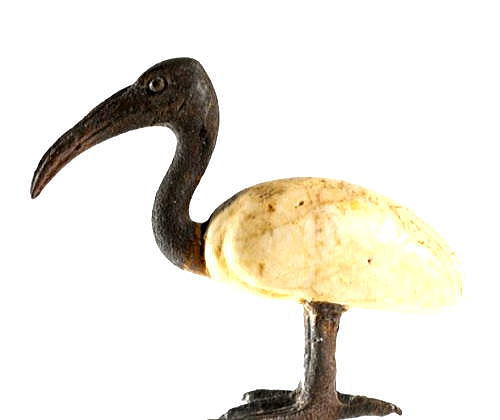 朱鷺の形をした奉納のための小像、体は方解石、頭と足はブロンズ製である。古代エジプト後期。 Votive statuette in the form of an ibis, the body made of calcite and the head and legs of bronze: Ancient Egyptian, Late Period. Source:the National Museum of Scotland 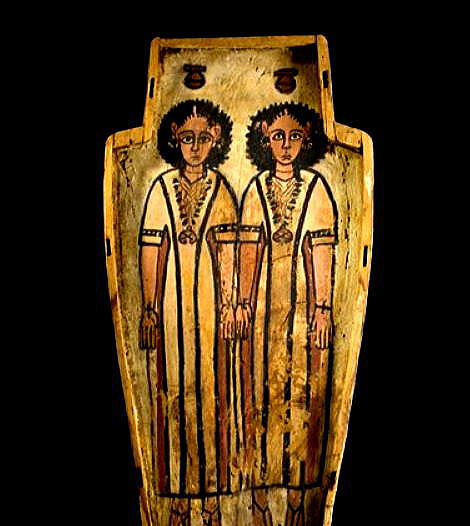 異母兄弟用の二人用棺、ペタムンとペンホルパビク:古代エジプト、上部エジプト、手ベス、後期ローマ時代、紀元175-200年。 Double coffin of two half-brothers, Petamun and Penhorpabik: Ancient Egyptian, Upper Egypt, Thebes, late Roman Period, c.175-200 AD. Source:the National Museum of Scotland 国立スコットランド博物館6」につづきます スコットランド総目次へ* |